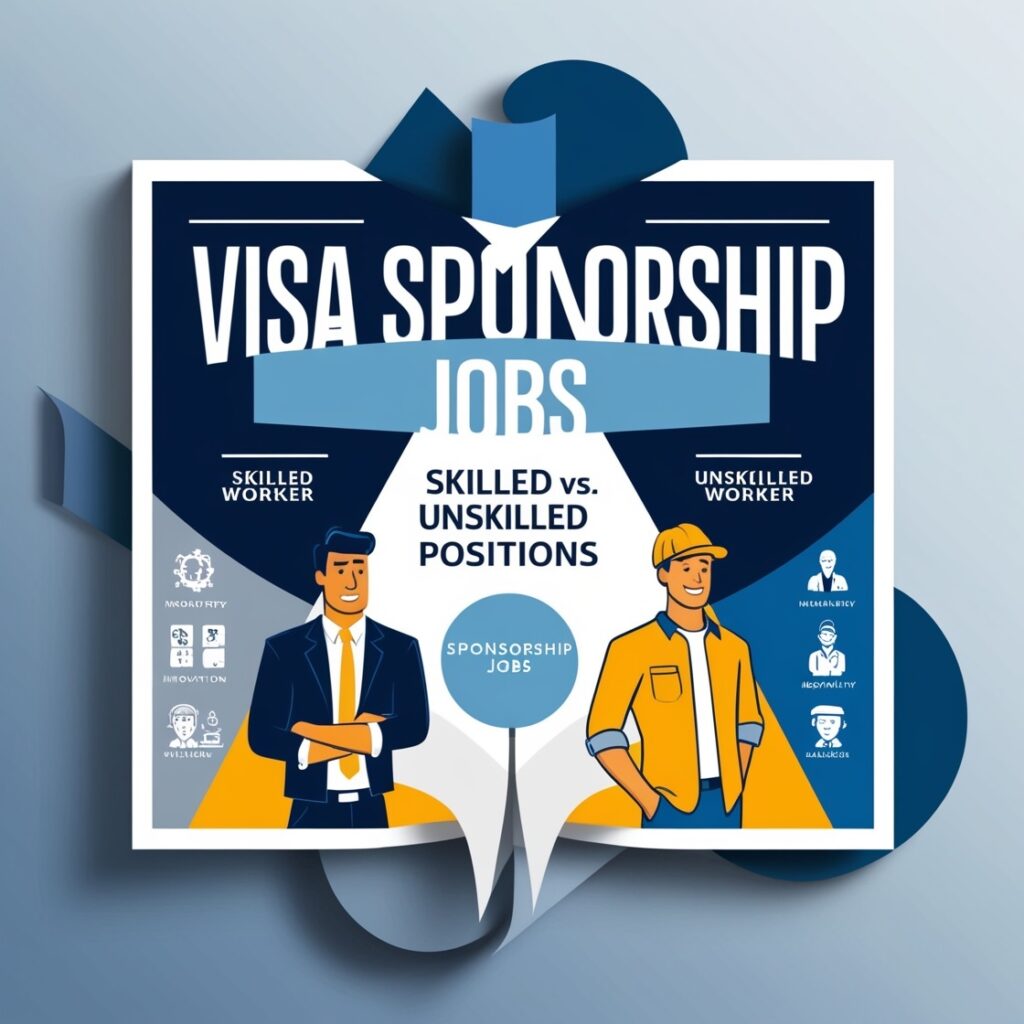Visa Sponsorship Jobs: Skilled vs. Unskilled Positions
The global labor market is increasingly dynamic, with international boundaries becoming less significant thanks to globalization. Visa sponsorship jobs play a crucial role in this context, allowing companies to hire foreign nationals to fill various roles. These roles can broadly be categorized into skilled and unskilled positions, each serving distinct needs in the workforce. Understanding the differences between these categories is essential for both employers looking to sponsor visas and individuals seeking employment abroad.
Understanding Skilled Positions
- Definition and Examples
- Skilled jobs typically require specific educational backgrounds, qualifications, and professional experience. These positions often demand a high level of expertise and competency. Examples include software engineers, doctors, teachers, and engineers. Such roles not only require formal education but also specialized training and significant work experience.
- Visa Requirements
- For skilled positions, visa sponsorship often involves strict eligibility criteria, including proof of qualifications and sometimes a labor market test to ensure no suitable local candidates are available. Common visa types for skilled workers include the H-1B in the United States, the Tier 2 visa in the UK, and the 482 Temporary Skill Shortage visa in Australia.
- Advantages of Hiring Skilled Workers
- Employing skilled foreign workers can bring in fresh perspectives and a diverse set of skills, fostering innovation and improving competitive advantage. Companies might also sponsor visas for skilled workers to fill gaps in the local labor market, which can be crucial in sectors facing skill shortages.
- Challenges
- The process of sponsoring skilled workers can be complex and costly, requiring significant paperwork and legal compliance. Moreover, there is often public and political scrutiny around the hiring of foreign workers, which can impact the employer’s brand and operational strategies.
Understanding Unskilled Positions

- Definition and Examples
- Unskilled jobs typically do not require a formal education or specialized training, making them accessible to a wider pool of applicants. Examples include roles in housekeeping, agricultural labor, and certain types of construction work. These jobs are crucial for the daily operations of many industries, often being labor-intensive and requiring physical work.
- Visa Requirements
- Visa sponsorship for unskilled labor can vary widely from country to country. Some nations have specific programs aimed at filling unskilled positions when there is a clear shortage of local workers, like the H-2A and H-2B visas in the United States for agricultural and non-agricultural workers, respectively.
- Advantages of Hiring Unskilled Workers
- Unskilled foreign workers can be essential in sectors where there is a seasonal or cyclical demand for labor. Employers often rely on visa sponsorship to maintain a flexible workforce that can be scaled up or down based on business needs.
- Challenges
- The primary challenge with hiring unskilled foreign workers is the potential for exploitation and violation of workers’ rights, given the typically lower wages and less stringent regulations in these jobs. Additionally, political and social issues such as immigration control can also complicate the sponsorship of visas for unskilled positions.
Comparative Analysis of Skilled and Unskilled Visa Sponsorship Jobs
- Impact on Local Economy
- Skilled workers tend to contribute significantly to technological advancement and innovation, potentially leading to economic growth. In contrast, unskilled workers are often essential in supporting industries that are foundational to the local economy, such as agriculture and construction.
- Regulatory Scrutiny
- Skilled worker visas generally face higher regulatory scrutiny, reflecting concerns about wage levels and the displacement of local employees. Unskilled worker visas, while equally important, are often more influenced by the need to fill labor shortages quickly.
- Duration of Stay and Path to Citizenship
- Visa sponsorship for skilled positions often comes with the possibility of transitioning to permanent residency and, eventually, citizenship. Unskilled positions, however, are typically linked to temporary or seasonal work visas without a direct path to long-term residency.
- Economic and Social Impact
- Both types of employment have profound impacts on the host country’s economy and society. While skilled immigrants often contribute to high-value sectors, unskilled workers play a vital role in tasks essential to everyday life and economic stability.
In conclusion, while the processes and impacts of sponsoring skilled and unskilled workers differ, both are integral to the global economic ecosystem. Employers must navigate complex regulatory environments, but the benefits of a diverse and dynamic workforce are undeniable. As globalization continues to evolve, the strategies surrounding the sponsorship of skilled and unskilled visas will remain a significant aspect of international business and labor markets.

